| Listing 1 - 10 of 14 | << page >> |
Sort by
|
Book
Abstract | Keywords | Export | Availability | Bookmark
 Loading...
Loading...Choose an application
- Reference Manager
- EndNote
- RefWorks (Direct export to RefWorks)
Reflecting upon his experience making his 2010 feature film Mothers, a cinematic triptych interweaving three narratives that are each, in their own way, about the often tenuous lines between truth and fiction, and one of which actually morphs into a documentary about the aftermath in a small Macedonian town where three retired cleaning women were found raped and killed in 2008 and the murderer turned out to be the journalist covering the story for a major Macedonian newspaper, the Oscar-nominated Macedonian-born and New York-based writer-director Milcho Manchevski writes that, "Most of us look at films differently or accept stories in a different way if we believe that they are true. We watch a documentary film in a different way from the way we watch a drama. We read a magazine article in a different way from the way in which we read a short story. Sometimes, we even treat a film that employs actors differently than a regular drama because we were told that it is based on something that really happened. We treat these works based on truth or reporting on the truth in different ways. Why? What is it in our relation to reality or in our relation to what we perceive to be reality that makes us value a work of artifice (an art piece) differently depending on our knowledge or conviction of whether that work of artifice is based on events that really took place?" In this extended essay, or letter, Manchevski ruminates the different ways in which both filmmakers and audiences create, experience, and absorb the cinematic narrative with a certain trust and faith in the artwork to render, not the factual truth, per se, but the importantly shared experience of trusting "the plane of reality created by the work itself," such that "we trust its inner logic and integrity, we have faith in what happens while we give ourselves to this work of art." Truth becomes a question of what artist and audience can see and feel together: what feels real becomes the world we inhabit. The book also includes an Afterword, "Truth Approaches, Reality Affects," by internationally renowned film scholar Adrian Martin.
Motion pictures --- Motion picture audiences. --- Production and direction. --- Philosophy. --- aesthetics --- Macedonia --- film studies --- cinema vérité
Book
ISBN: 2753561583 Year: 2018 Publisher: Rennes Presses universitaires de Rennes
Abstract | Keywords | Export | Availability | Bookmark
 Loading...
Loading...Choose an application
- Reference Manager
- EndNote
- RefWorks (Direct export to RefWorks)
Peut-on se réclamer du « cinéma » tout en prétendant rendre compte d'une « vérité » ? Quelles sont les limites éthiques du dévoilement d'un individu face à une caméra ? Un cinéaste peut-il être pleinement « auteur » d'une œuvre construite à partir de fragments de réel ? Voilà quelques-unes des questions posées au début des années soixante par la sortie des films qui se revendiquent ou sont associés au « cinéma-vérité ». Proposée en 1960 par Edgar Morin, cette notion controversée sert durant quelques années de bannière à un mouvement cinématographique supposé renouveler les rapports entre film et réalité par une approche plus directe, un dispositif d'interactions avec les protagonistes, ou une démarche autoréflexive qui interroge en son sein le projet du film. Chronique d'un été de Jean Rouch et Edgar Morin, Les Inconnus de la terre et Regard sur la folie de Mario Ruspoli, les travaux de Richard Leacock pour la Drew Associates, Le Chemin de la mauvaise route de Jean Herman, Hitler, connais pas de Bertrand Blier, La Punition de Jean Rouch ou encore Le Joli Mai de Pierre Lhomme et Chris Marker : tous ces « films-vérité » renouvellent les débats et construisent de nouveaux clivages dans la cinéphilie française. Sans chercher à se positionner sur le contenu des polémiques, le présent ouvrage retrace pour la première fois l'histoire du mouvement « cinéma-vérité » en s'intéressant aux films (contexte de production, tournages, innovations techniques) et aux discours (articles, débats, tables rondes) qui les ont précédés, accompagnés et traversés. Grâce à de nombreuses sources inédites, Cinéma-vérité, films et controverses met au jour un phénomène d'une importance méconnue dans l'histoire du cinéma en France.
Film Radio Television --- cinéma --- cinéma français --- histoire du cinéma --- cinéma-vérité
Book
ISBN: 2804135438 9782804135430 Year: 2000 Volume: *7 Publisher: Bruxelles De Boeck
Abstract | Keywords | Export | Availability | Bookmark
 Loading...
Loading...Choose an application
- Reference Manager
- EndNote
- RefWorks (Direct export to RefWorks)
Art cinématographique --- Filmkunst --- Documentary films --- Motion pictures and language --- Motion pictures --- Reality in motion pictures --- Documentaires --- Cinéma et langue --- Cinéma --- Réalité au cinéma --- History and criticism --- Production and direction --- Philosophy --- Histoire et critique --- Production et réalisation --- Philosophie --- Realism in motion pictures --- Cinéma vérité --- Cinema verite --- Realism in moving-pictures --- Direct cinema --- Truth cinema --- History and criticism. --- Cinéma vérité. --- Realism in motion pictures. --- Cinéma et langue --- Cinéma --- Réalité au cinéma --- Production et réalisation --- Cinéma vérité --- CDL --- 791.41 --- Documentary films - History and criticism
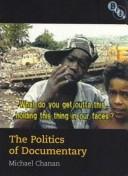
ISBN: 9781844572267 9781844572274 Year: 2007 Publisher: London British Film Institute
Abstract | Keywords | Export | Availability | Bookmark
 Loading...
Loading...Choose an application
- Reference Manager
- EndNote
- RefWorks (Direct export to RefWorks)
documentaires --- free cinema --- cinéma vérité --- direct cinema --- klank --- film en politiek --- Film --- Films documentaires --- Cinéma --- Aspect politique --- Histoire et critique --- Production et réalisation --- film --- geluid --- televisie --- politiek --- 791.43 --- Aspect politique. --- Histoire et critique. --- Production et réalisation.
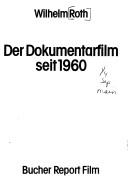
ISBN: 3765803979 Year: 1982 Publisher: München Bucher
Abstract | Keywords | Export | Availability | Bookmark
 Loading...
Loading...Choose an application
- Reference Manager
- EndNote
- RefWorks (Direct export to RefWorks)
Documentary films --- 791.43 --- Chili --- cinéma direct --- cinéma-vérité --- Cuba --- direct cinema --- documentaires --- film --- film en politiek --- Latijns-Amerika --- mei 68 --- super 8 --- video --- videokunst --- Viëtnam --- Wilhelm Roth --- Zuid-Amerika --- History and criticism
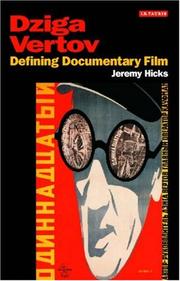
ISBN: 9781845113773 9781845113766 1845113772 Year: 2007 Publisher: London I.B. Tauris
Abstract | Keywords | Export | Availability | Bookmark
 Loading...
Loading...Choose an application
- Reference Manager
- EndNote
- RefWorks (Direct export to RefWorks)
Motion picture producers and directors --- Documentary films --- Producteurs et réalisateurs de cinéma --- Documentaires --- History and criticism. --- Histoire et critique --- Vertov, Dziga, --- film --- documentaire --- Rusland --- Sovjet-Unie --- Vertov Dziga --- twintigste eeuw --- film en propaganda --- cinéma-vérité --- 791.471 VERTOV --- Producteurs et réalisateurs de cinéma
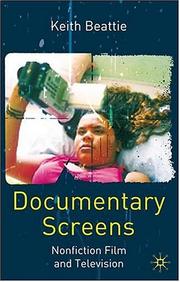
ISBN: 033374117X 9780333741177 Year: 2004 Publisher: Basingstoke Palgrave Macmillan
Abstract | Keywords | Export | Availability | Bookmark
 Loading...
Loading...Choose an application
- Reference Manager
- EndNote
- RefWorks (Direct export to RefWorks)
Documentary films --- Documentary television programs --- History and criticism. --- #KVHA:Documentaires --- #KVHA:Media --- #KVHA:Non-fictie film --- 791.41 --- 791.43 --- antropologie --- autobiografie --- autobiografische film --- cinéma vérité --- compilatiefilms --- direct cinema --- documentaire film --- documentaires --- etnografie --- film --- film en antropologie --- film en etnografie --- televisie --- televisiedocumentaires --- tv-documentaires --- Documentaries, Television --- Documentary programs, Television --- Telementaries --- Television documentaries --- Television documentary programs --- Documentary mass media --- Nonfiction television programs --- History and criticism
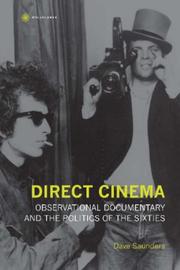
ISBN: 9781905674152 9781905674169 1905674155 1905674163 Year: 2007 Publisher: London Wallflower
Abstract | Keywords | Export | Availability | Bookmark
 Loading...
Loading...Choose an application
- Reference Manager
- EndNote
- RefWorks (Direct export to RefWorks)
"Direct Cinema is the first comprehensive study of the seminal 'reactive observationalist ' movement of 1960s America. During a pivotal epoch in the history of American cultural expression, pioneers such as Robert Drew, D. A. Pennebaker and Frederick Wiseman used mobile cameras and synchronized sound to reveal the hidden side of their turbulent times - from behind-the-scenes footage of John F. Kennedy's presidential campaign in Primary (1960), through epic coverage of the legendary Woodstock festival (Woodstock, 1970), to the downtrodden and dispossessed subjects of Wiseman's 'reality fictions'. Outlining the methods and achievements of these filmmakers, who together created the notion of the 'fly on the wall' documentary, this volume suggests that direct cinema was not only closely attuned to the artistic and political revolutions of the 1960s, but also representative of a resurgence of the United States homegrown philosophical ideals."--BOOK JACKET.
History of civilization --- Film --- United States --- Cinéma vérité --- Documentary films --- Cinéma direct --- Documentaires --- Etats-Unis --- Social conditions --- Conditions sociales --- Motion pictures --- History. --- Political aspects. --- États-Unis --- film --- documentaires --- Verenigde Staten --- direct cinema --- politiek --- film en politiek --- sixties --- Wiseman Frederick --- Drew Robert --- Pennebaker Donn A. --- 791.43 --- Cinéma vérité --- Cinéma direct --- Pennebaker Donn A --- Political aspects --- United States of America --- Années 1960 --- Au cinéma --- Années 1960 --- États-Unis --- Au cinéma
Book
ISBN: 9781441124579 1441124578 Year: 2012 Publisher: New York : Continuum,
Abstract | Keywords | Export | Availability | Bookmark
 Loading...
Loading...Choose an application
- Reference Manager
- EndNote
- RefWorks (Direct export to RefWorks)
Documentary films --- History and criticism. --- film --- documentaires --- documentaire film --- Flaherty Robert --- Flaherty Frances --- Rusland --- Sovjet-Unie --- Groot-Brittannië --- Verenigde Staten --- wereldoorlog II --- Canada --- filmgeschiedenis --- televisiedocumentaires --- tv-documentaires --- British Free Cinema --- New American Cinema --- cinéma vérité --- direct cinema --- twintigste eeuw --- eenentwintigste eeuw --- Burns Ken --- Herzog Werner --- James Steve --- Gibney Alex --- Guggenheim Davis --- Morris Errol --- Sinofsky & Berlinger --- Nelson Stanley --- Watkins Peter --- 791.41 --- 791.43 --- Documentary films. --- Media Studies. --- History and criticism --- Films documentaires --- Histoire et critique
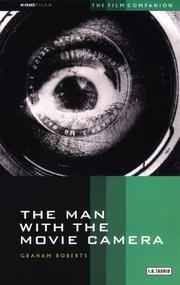
ISBN: 1860643949 Year: 2000 Volume: 2 Publisher: London I.B. Tauris
Abstract | Keywords | Export | Availability | Bookmark
 Loading...
Loading...Choose an application
- Reference Manager
- EndNote
- RefWorks (Direct export to RefWorks)
Motion pictures --- Documentary films --- Cinéma --- Documentaires --- Vertov, Dziga, --- Criticism and interpretation. --- Chelovek s kinoapparatom. --- film --- documentaire --- Rusland --- Sovjet-Unie --- Vertov Dziga --- twintigste eeuw --- cinéma-vérité --- 791.471 VERTOV --- Cinéma --- Kaufman, Denis Arkadʹevich, --- Wertow, Dsiga, --- Kaufman, Dionigin Arkadievitch, --- Kaufman, David Abelevich, --- Kaufman, Denis Abramovich, --- Вертов, Дзига, --- Кауфман, Денис Аркадьевич, --- Кауфман, Давид Абелевич, --- Кауфман, Денис Абрамович, --- Chelovek s kinoapparatom (Motion picture) --- Человек с киноаппаратом (Motion picture) --- Man with the movie camera (Motion picture) --- Man with movie camera (Motion picture) --- Man with a movie camera (Motion picture) --- Homme à la caméra (Motion picture) --- Chelovek kino-apparatom (Motion picture) --- Человек кино-аппаратом (Motion picture)
| Listing 1 - 10 of 14 | << page >> |
Sort by
|

 Search
Search Feedback
Feedback About UniCat
About UniCat  Help
Help News
News